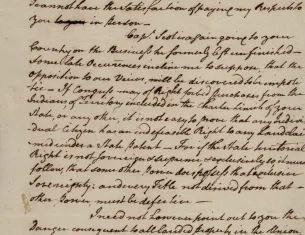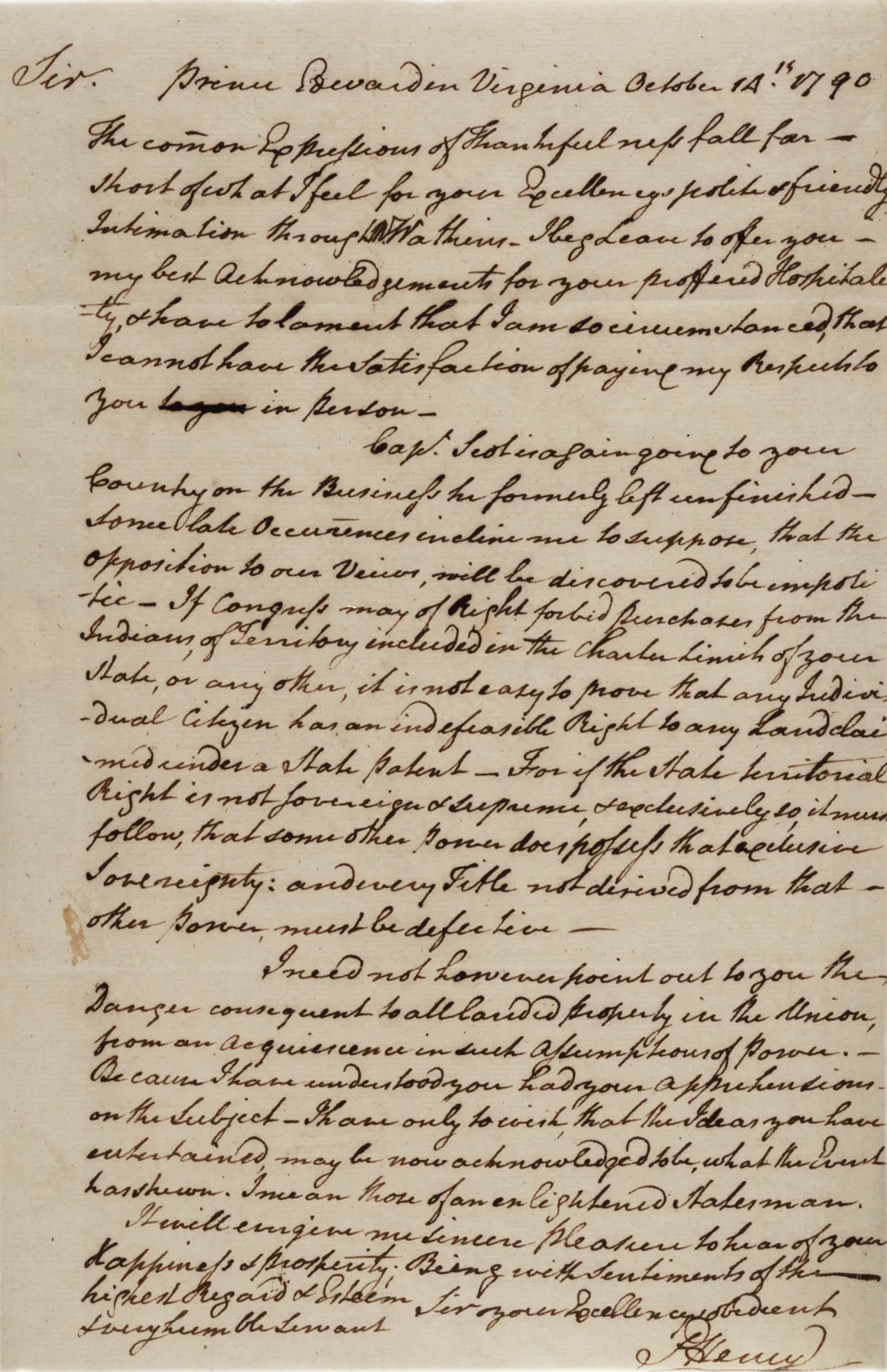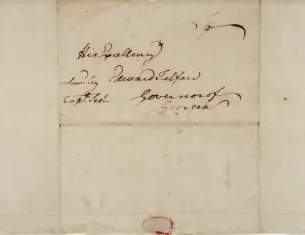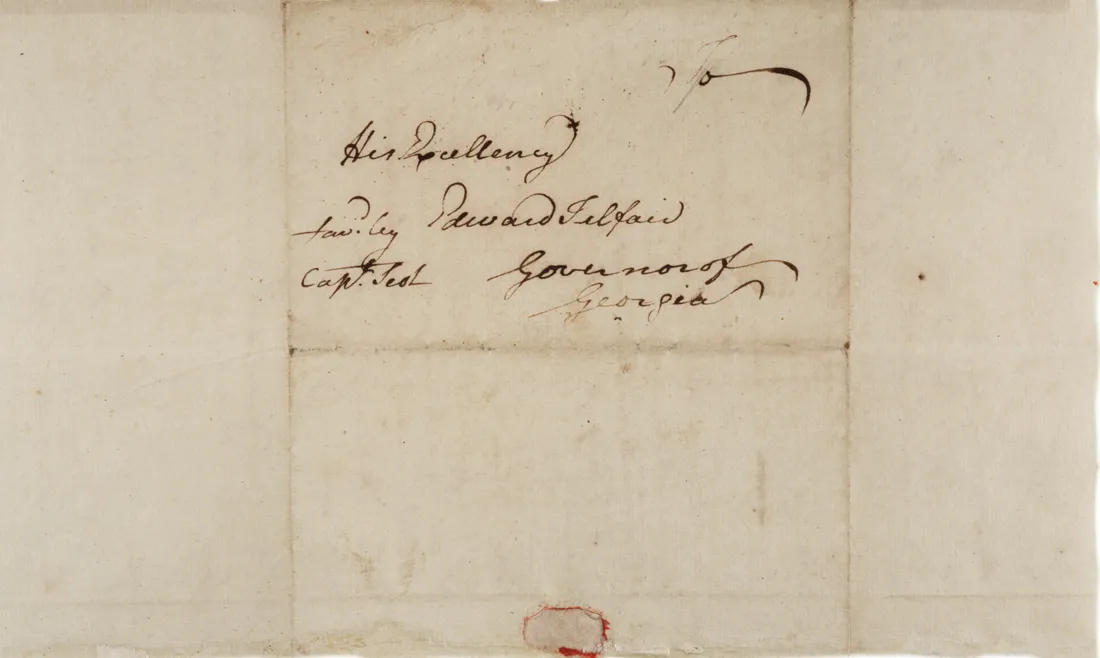Patrick Henry on States’ Rights, 1790
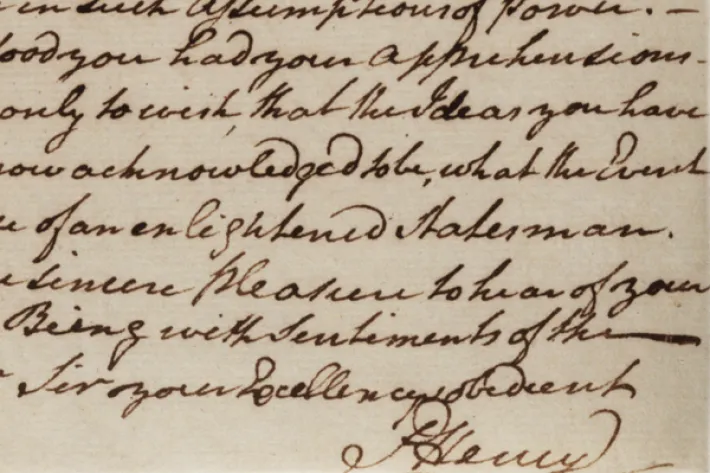
Patrick Henry to Edward Telfair, October 14, 1790. (The Gilder Lehrman Institute of American History)
In this letter to the governor of Georgia, Henry defends states’ rights. Citing the Indian Trade and Intercourse Act of July 1790, he argues that if the US Congress becomes the arbiter of land titles, the sovereignty of states will be diminished.
A Letter from Patrick Henry to Edward Telfair, October 14, 1790
Prince Edward in Virginia
October 14.th 1790
Sir.
The comon Expressions of Thankfulness fall far— short of what I feel for your Excellencys polite & friendly Intimation through Mr. Walthius. I beg Leave to offer you— my best Acknowledgements for your proffered Hospitality, & have to lament that I am so circumstanced, that I cannot have the Satisfaction of paying my Respects to you in person.
Capt. Scot is again going to your Country on the Business he formerly left unfinished. Some late Occurrences incline me to suppose, that the opposition to our Views, will be discovered to be impolitic. If Congress may of Right forbid purchases from the Indians, of Territory included in the charter limits of your State, or any other, it is not easy to prove that any Individual Citizen has an indefeasible Right to any Land claimed under a State patent. For if the State territorial Right is not Sovereign & Supreme, & exclusively so, it must follow, that some other power does possess that exclusive Sovereignty: and every Title not derived from that— other power, must be defective—
I need not however point out to you the Danger consequent to all landed property in the Union, from an acquiescence in such assumptions of Power.— Because I have understood you had your apprehensions on the Subject. I have only to wish that the Ideas you have entertained, may be now acknowledged to be, what the Event has shown. I mean those of an enlightened Statesman. It will ever give me sincere pleasure to hear of your Happiness & prosperity; Being with Sentiments of the highest Regard & Esteem.
Sir your Excellencys obedient & very humble Servant
P Henry
Source: Patrick Henry to Edward Telfair, October 14, 1790, The Gilder Lehrman Institute of American History, GLC06406.
A Letter from Patrick Henry to Edward Telfair, October 14, 1790
Prince Edward in Virginia
October 14.th 1790
Sir.
The comon Expressions of Thankfulness fall far — short of what I feel for your Excellencys polite & friendly Intimation through Mr. Walthius. I beg Leave to offer you— my best Acknowledgements for your proffered Hospitality, & have to lament that I am so circumstanced, that I cannot have the Satisfaction of paying my Respects to you in person . . .
Some late Occurrences incline me to suppose, that the opposition to our Views, will be discovered to be impolitic. If Congress may of Right forbid purchases from the Indians, of Territory included in the charter limits of your State, or any other, it is not easy to prove that any Individual Citizen has an indefeasible Right to any Land claimed under a State patent. For if the State territorial Right is not Sovereign & Supreme, & exclusively so, it must follow, that some other power does possess that exclusive Sovereignty: and every Title not derived from that— other power, must be defective —
I need not however point out to you the Danger consequent to all landed property in the Union, from an acquiescence in such assumptions of Power. — Because I have understood you had your apprehensions on the Subject. I have only to wish that the Ideas you have entertained, may be now acknowledged to be, what the Event has shown. I mean those of an enlightened Statesman. It will ever give me sincere pleasure to hear of your Happiness & prosperity; Being with Sentiments of the highest Regard & Esteem.
Sir your Excellencys obedient & very humble Servant
P Henry
Source: Patrick Henry to Edward Telfair, October 14, 1790, The Gilder Lehrman Institute of American History, GLC06406.
impolitic – unwise
indefeasible – unable to be lost or surrendered
Background
In this letter to the governor of Georgia, Henry defends states’ rights. Citing the Indian Trade and Intercourse Act of July 1790, he argues that if the US Congress becomes the arbiter of land titles, the sovereignty of states will be diminished.
Transcript
A Letter from Patrick Henry to Edward Telfair, October 14, 1790
Prince Edward in Virginia
October 14.th 1790
Sir.
The comon Expressions of Thankfulness fall far— short of what I feel for your Excellencys polite & friendly Intimation through Mr. Walthius. I beg Leave to offer you— my best Acknowledgements for your proffered Hospitality, & have to lament that I am so circumstanced, that I cannot have the Satisfaction of paying my Respects to you in person.
Capt. Scot is again going to your Country on the Business he formerly left unfinished. Some late Occurrences incline me to suppose, that the opposition to our Views, will be discovered to be impolitic. If Congress may of Right forbid purchases from the Indians, of Territory included in the charter limits of your State, or any other, it is not easy to prove that any Individual Citizen has an indefeasible Right to any Land claimed under a State patent. For if the State territorial Right is not Sovereign & Supreme, & exclusively so, it must follow, that some other power does possess that exclusive Sovereignty: and every Title not derived from that— other power, must be defective—
I need not however point out to you the Danger consequent to all landed property in the Union, from an acquiescence in such assumptions of Power.— Because I have understood you had your apprehensions on the Subject. I have only to wish that the Ideas you have entertained, may be now acknowledged to be, what the Event has shown. I mean those of an enlightened Statesman. It will ever give me sincere pleasure to hear of your Happiness & prosperity; Being with Sentiments of the highest Regard & Esteem.
Sir your Excellencys obedient & very humble Servant
P Henry
Source: Patrick Henry to Edward Telfair, October 14, 1790, The Gilder Lehrman Institute of American History, GLC06406.
Excerpt
A Letter from Patrick Henry to Edward Telfair, October 14, 1790
Prince Edward in Virginia
October 14.th 1790
Sir.
The comon Expressions of Thankfulness fall far — short of what I feel for your Excellencys polite & friendly Intimation through Mr. Walthius. I beg Leave to offer you— my best Acknowledgements for your proffered Hospitality, & have to lament that I am so circumstanced, that I cannot have the Satisfaction of paying my Respects to you in person . . .
Some late Occurrences incline me to suppose, that the opposition to our Views, will be discovered to be impolitic. If Congress may of Right forbid purchases from the Indians, of Territory included in the charter limits of your State, or any other, it is not easy to prove that any Individual Citizen has an indefeasible Right to any Land claimed under a State patent. For if the State territorial Right is not Sovereign & Supreme, & exclusively so, it must follow, that some other power does possess that exclusive Sovereignty: and every Title not derived from that— other power, must be defective —
I need not however point out to you the Danger consequent to all landed property in the Union, from an acquiescence in such assumptions of Power. — Because I have understood you had your apprehensions on the Subject. I have only to wish that the Ideas you have entertained, may be now acknowledged to be, what the Event has shown. I mean those of an enlightened Statesman. It will ever give me sincere pleasure to hear of your Happiness & prosperity; Being with Sentiments of the highest Regard & Esteem.
Sir your Excellencys obedient & very humble Servant
P Henry
Source: Patrick Henry to Edward Telfair, October 14, 1790, The Gilder Lehrman Institute of American History, GLC06406.
impolitic – unwise
indefeasible – unable to be lost or surrendered
